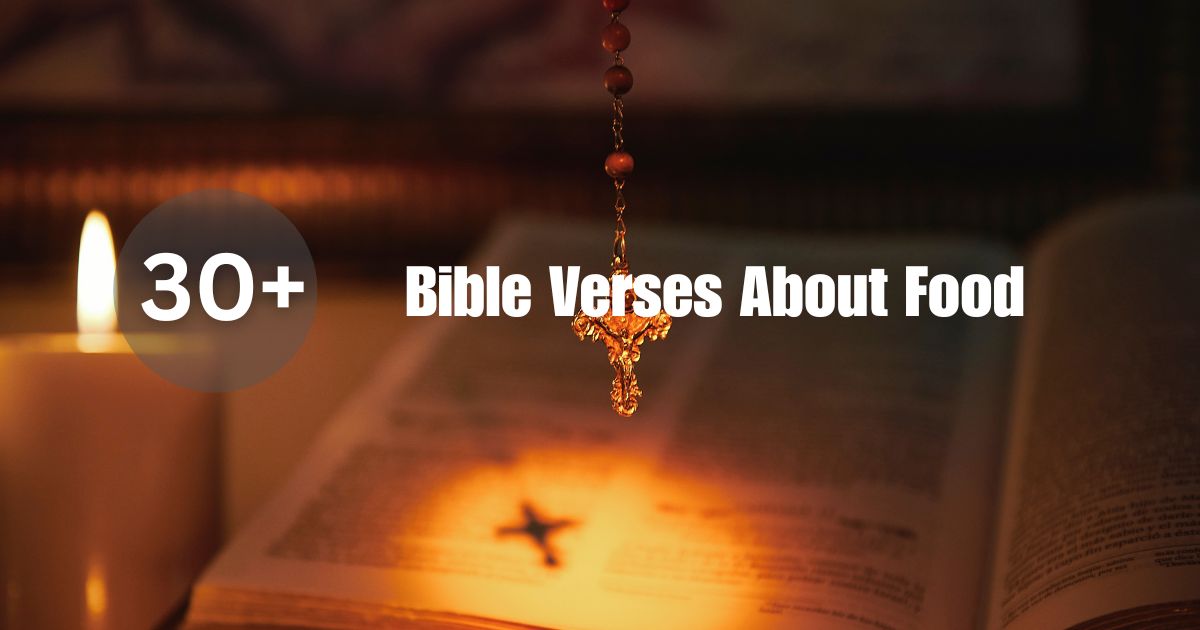Have you ever wondered if your faith should influence your plate? You are not alone. Many people seek clear guidance, looking for Bible verses about food to understand God’s perspective on eating. It is easy to feel caught between cultural trends and a desire for biblical truth.
This search is about more than just rules. It is about finding a foundation for gratitude, health, and celebration. Let us explore the wisdom scripture offers, moving beyond a simple list to discover a balanced and gracious view of the food we enjoy each day.
What Does The Bible Say About Food?
The Bible presents food first and foremost as a good gift from God. From the very beginning, God provided plants and fruits for humanity to eat (Genesis 1:29), establishing that His creation is intended for our nourishment and enjoyment. We are encouraged to receive this gift with thankful hearts, for everything God created is good, and nothing is to be rejected if it is received with thanksgiving (1 Timothy 4:4). This perspective transforms eating from a routine act into an act of worship, where even a simple meal can be enjoyed for the glory of God (1 Corinthians 10:31).
Beyond physical sustenance, the Bible uses food to teach deeper spiritual truths. It warns against the dangers of gluttony, where food becomes an idol (Philippians 3:19), and highlights the importance of self-control. Most significantly, Jesus revealed that He Himself is the ultimate nourishment, the true bread from heaven that gives eternal life (John 6:35). This teaches us that while God provides for our physical needs, our deepest hunger is spiritual and can only be satisfied by a relationship with Him.
List Of Bible Verses About Food
Genesis 1:29
Verse: “Then God said, ‘I give you every seed-bearing plant on the face of the whole earth and every tree that has fruit with seed in it. They will be yours for food.'”
- Meaning: God is giving people all the plants and fruits they need to eat. It shows that God planned for our needs from the very beginning.
- Context: This is from the story of creation. God had just made the first people, Adam and Eve, and was providing for them in a perfect world.
- Practical Application: We can see the food we eat as a gift from God. It encourages us to be thankful for the natural world God created to sustain us.
Psalm 65:9
Verse: “You care for the land and water it; you enrich it abundantly. The streams of God are filled with water to provide the people with grain, for so you have ordained it.”
- Meaning: God actively takes care of the earth to make food grow. He sends rain and makes the soil rich so that we can have bread.
- Context: This is a song of praise thanking God for His power and His generous care for the earth.
- Practical Application: When we see rain or a good harvest, we can remember that God is behind it. It teaches us to thank God for the entire process that brings food to our tables.
Psalm 104:14
Verse: “He makes grass grow for the cattle, and plants for people to cultivate—bringing forth food from the earth.”
- Meaning: God provides food for every creature. He makes grass for animals and plants for people, all coming from the earth He created.
- Context: This psalm is a poem describing how God wisely designed and cares for every part of the world.
- Practical Application: This reminds us that God cares for all of His creation. We can trust Him to provide what we need and be good stewards of the earth.
Ecclesiastes 9:7
Verse: “Go, eat your food with gladness, and drink your wine with a joyful heart, for God has already approved what you do.”
- Meaning: God wants us to enjoy the good things in life, like food and drink. We should be happy and not feel guilty about it because it is a gift from Him.
- Context: This is advice about finding happiness in life’s simple pleasures, seeing them as gifts from God.
- Practical Application: We should enjoy our meals with a thankful and joyful attitude. Life is meant to be lived with gratitude for God’s gifts.
Isaiah 55:2
Verse: “Why spend money on what is not bread, and your labor on what does not satisfy? Listen, listen to me, and eat what is good, and you will delight in the richest of fare.”
- Meaning: God asks why we waste our energy on things that don’t truly satisfy us. He invites us to come to Him for what is truly good and fulfilling.
- Context: God is calling His people to leave their empty ways and return to Him, who alone can satisfy their deepest needs.
- Practical Application: This verse challenges us to think about what we are “hungry” for. Are we seeking things that don’t last? True satisfaction is found in a relationship with God.
John 6:35
Verse: “Then Jesus declared, ‘I am the bread of life. Whoever comes to me will never go hungry, and whoever believes in me will never be thirsty.'”
- Meaning: Jesus is saying that He is the most essential food for our souls. Trusting in Him satisfies our deepest spiritual hunger and thirst.
- Context: Jesus said this after feeding thousands of people with bread and fish. He wanted them to see that He was the true miracle, not just the food.
- Practical Application: While God gives us physical food, we need spiritual food even more. We find this by believing in Jesus and following Him.
1 Timothy 4:4
Verse: “For everything God created is good, and nothing is to be rejected if it is received with thanksgiving.”
- Meaning: Since God created all food, it is good. We should not call any food unclean if we thank God for it.
- Context: The apostle Paul was correcting false teachers who said certain foods were wrong to eat.
- Practical Application: We can enjoy all kinds of food without guilt. The key is to always thank God for it.
1 Timothy 4:5
Verse: “because it is consecrated by the word of God and prayer.”
- Meaning: When we thank God for our food (prayer) and remember His promise that it is good (His word), the food is set apart as a holy gift for us.
- Context: This verse continues the thought from 1 Timothy 4:4.
- Practical Application: Saying a prayer before a meal isn’t just a tradition. It is a way of recognizing that our food is a gift from God, which makes the meal special.
Genesis 1:30
Verse: “Then God said, ‘I give you every green plant for food.’ And it was so.”
- Meaning: God also provided food for all the animals, showing His care for every living thing.
- Context: This is part of the same creation story as Genesis 1:29, where God is providing for all the creatures He made.
- Practical Application: This reminds us of God’s care for the entire world. It can inspire us to be kind and responsible towards animals and the environment.
Psalm 23:1-2
Verse: “The Lord is my shepherd, I lack nothing. He makes me lie down in green pastures, he leads me beside quiet waters.”
- Meaning: God is like a good shepherd who takes care of us. He provides everything we need, giving us rest and refreshment.
- Context: King David wrote this psalm describing his own trust in God’s guidance and provision.
- Practical Application: We can trust God to lead us and provide for our needs. He offers us peace and rest in our busy lives, just like a shepherd cares for his sheep.
Matthew 15:36
Verse: “Then he took the seven loaves and the fish, and when he had given thanks, he broke them and gave them to the disciples, and they in turn to the people.”
- Meaning: Jesus thanked God for the food before distributing it. This shows gratitude and dependence on God, even when the amount of food seems small.
- Context: This happened when Jesus performed a miracle, feeding a crowd of 4,000 people with only seven loaves of bread and a few small fish.
- Practical Application: We should always remember to thank God for our food, trusting that He can provide and multiply our resources.
Romans 14:17
Verse: “For the kingdom of God is not a matter of eating and drinking, but of righteousness, peace and joy in the Holy Spirit.”
- Meaning: What we eat and drink is not the most important thing in our spiritual life. What truly matters is right living, peace with others, and joy that comes from God’s Spirit.
- Context: Paul was writing to Christians who were arguing over whether it was right to eat certain foods. He told them not to focus on minor rules.
- Practical Application: We should not judge others or cause conflict over personal choices like food. Our focus should be on living a godly life and having peace and joy.
Romans 14:6
Verse: “Whoever regards one day as special does so to the Lord. Whoever eats meat does so to the Lord, for they give thanks to God; and whoever abstains does so to the Lord and gives thanks to God.”
- Meaning: Whether a person eats meat or chooses not to, the important thing is that they do it for God and thank Him for it.
- Context: This continues the teaching to the Romans about not judging each other’s personal decisions.
- Practical Application: We can have different personal habits and diets. What unites us is that we do everything for God and with a thankful heart.
1 Corinthians 10:31
Verse: “So whether you eat or drink or whatever you do, do it all for the glory of God.”
- Meaning: Every part of our lives, even ordinary things like eating and drinking, can be an opportunity to honor God.
- Context: Paul was teaching Christians how to make wise choices, especially when their actions might affect others.
- Practical Application: We can ask ourselves a simple question before we eat or do anything: “Does this honor God?” This helps us live with purpose.
1 Corinthians 11:24
Verse: “and when he had given thanks, he broke it and said, ‘This is my body, which is for you; do this in remembrance of me.'”
- Meaning: During the Last Supper, Jesus gave thanks for the bread and said it represented His body, which would be sacrificed for us. He told us to remember Him in this way.
- Context: This is part of the instructions for taking Communion, or the Lord’s Supper.
- Practical Application: When we take Communion, we remember Jesus’ great sacrifice for us. It also reminds us to be thankful for His gift of salvation.
Acts 2:46
Verse: “They broke bread in their homes and ate together with glad and sincere hearts.”
- Meaning: The first Christians shared meals regularly. These meals were happy times of genuine friendship and worship.
- Context: This describes the life of the very first church after Jesus ascended to heaven.
- Practical Application: Sharing a meal with other believers is a powerful way to build strong, joyful, and supportive relationships.
John 6:27
Verse: “Do not work for food that spoils, but for food that endures to eternal life, which the Son of Man will give you. For on him God the Father has placed his seal of approval.”
- Meaning: Jesus tells us not to focus only on physical food that runs out. Instead, we should seek the spiritual life that He gives, which lasts forever.
- Context: Jesus said this to people who were following Him because He had given them physical bread to eat.
- Practical Application: While we need to work for our daily food, our main goal in life should be to know Jesus and receive the eternal life He offers.
Find Out More : 10+ Bible Verses About Accountability: What Does Scripture Say?
Matthew 14:19
Verse: “Then he told the people to sit down on the grass. Taking the five loaves and the two fish and looking up to heaven, he gave thanks and broke the loaves. Then he gave them to the disciples, and the disciples gave them to the people.”
- Meaning: Jesus thanked God for a small lunch and used it to feed a huge crowd. This shows that God can do amazing things with what we offer to Him.
- Context: This is the miracle of Jesus feeding over 5,000 people with just five loaves and two fish.
- Practical Application: We should bring what we have to God, thank Him for it, and trust that He can use it in ways we never imagined.
John 6:33
Verse: “For the bread of God is the bread that comes down from heaven and gives life to the world.”
- Meaning: The true bread from God is not physical bread, but Jesus Himself. He came from heaven to offer spiritual life to everyone.
- Context: Jesus was explaining to the crowd that He was the true spiritual food they needed.
- Practical Application: Just as we need physical bread to live, we need Jesus to have true spiritual life. He is the most essential nourishment for our souls.
Matthew 6:11
Verse: “Give us today our daily bread.”
- Meaning: This is a prayer asking God to provide what we need for today. It shows we depend on Him for our basic needs, one day at a time.
- Context: This is a line from the Lord’s Prayer, which Jesus taught His disciples as a model for how to pray.
- Practical Application: We can pray this simple prayer every day. It teaches us to trust God for our needs and not to worry too much about the future.
Matthew 15:36
Verse: “Then he took the seven loaves and the fish, and when he had given thanks, he broke them and gave them to the disciples, and they in turn to the people.”
- Meaning: Jesus showed thanks to God for the food before eating it. This teaches us to be grateful for what we have, even if it seems small.
- Context: Jesus was about to feed a huge crowd of 4,000 people with only seven loaves and a few fish.
- Practical Application: Always remember to thank God for your food. It is a way of recognizing that He provides for you.
Romans 14:17
Verse: “For the kingdom of God is not a matter of eating and drinking, but of righteousness, peace and joy in the Holy Spirit.”
- Meaning: God’s main concern is not the food we eat. What is most important is living a good life, having peace with others, and having true joy from God.
- Context: Some Christians were arguing over correct foods to eat. Paul told them these arguments missed the point.
- Practical Application: Do not fight with others about food choices. Focus instead on being a peaceful, joyful, and good person.
Romans 14:6
Verse: “Whoever regards one day as special does so to the Lord. Whoever eats meat does so to the Lord, for they give thanks to God; and whoever abstains does so to the Lord and gives thanks to God.”
- Meaning: Whether a person eats meat or avoids it, both are acceptable if they do it for God and thank Him.
- Context: Paul was teaching about respecting different personal choices among believers.
- Practical Application: We should respect the dietary choices of others. The key is that everyone has a thankful heart toward God.
1 Corinthians 10:31
Verse: “So whether you eat or drink or whatever you do, do it all for the glory of God.”
- Meaning: Every small action, like eating and drinking, can be done in a way that honors God.
- Context: This was advice on how to make wise decisions in daily life.
- Practical Application: Before you eat, ask yourself if your actions honor God. This simple habit can guide your choices.
1 Corinthians 11:24
Verse: “and when he had given thanks, he broke it and said, ‘This is my body, which is for you; do this in remembrance of me.'”
- Meaning: Jesus used bread to represent His body, given for us. He told us to remember His sacrifice when we eat it.
- Context: This happened at the Last Supper, the night before Jesus died.
- Practical Application: When we take Communion, we remember Jesus’ great love and sacrifice for us.
Acts 2:46
Verse: “They broke bread in their homes and ate together with glad and sincere hearts.”
- Meaning: The first Christians shared meals in their homes. These times were filled with genuine happiness and friendship.
- Context: This describes the life of the very first church.
- Practical Application: Sharing a meal with other believers is a wonderful way to build strong and joyful relationships.
John 6:27
Verse: “Do not work for food that spoils, but for food that endures to eternal life, which the Son of Man will give you.”
- Meaning: Jesus said we should not focus only on physical food that runs out. We should seek the spiritual life He gives, which lasts forever.
- Context: People were following Jesus because He had fed them. He wanted them to seek Him for a deeper reason.
- Practical Application: While we need food to live, our main goal should be to know Jesus and receive the eternal life He offers.
Matthew 14:19
Verse: “Taking the five loaves and the two fish and looking up to heaven, he gave thanks and broke the loaves.”
- Meaning: Jesus thanked God for a small meal and used it to do a miracle.
- Context: Jesus fed over 5,000 people with just five loaves and two fish.
- Practical Application: Always be thankful for what you have, no matter how small it seems. God can do great things with it.
John 6:33
Verse: “For the bread of God is the bread that comes down from heaven and gives life to the world.”
- Meaning: The true bread from God is Jesus Himself. He came from heaven to give spiritual life to everyone.
- Context: Jesus was explaining that He is the most important nourishment we need.
- Practical Application: Just as our bodies need food, our spirits need Jesus to have true life.
Matthew 6:11
Verse: “Give us today our daily bread.”
- Meaning: This is a prayer asking God to provide what we need for today.
- Context: This is a line from the prayer Jesus taught His followers.
- Practical Application: Pray this to ask God for your needs and to trust Him one day at a time.
Leviticus 11:3
Verse: “You may eat any animal that has a divided hoof and that chews the cud.”
- Meaning: This was one of the rules God gave the Israelites about which animals they could eat.
- Context: These were part of the Old Testament laws given to set Israel apart from other nations.
- Practical Application: This rule shows us that God cared about every detail of His people’s lives. For Christians today, it reminds us of the history of God’s law.
Leviticus 11:9
Verse: “Of all the creatures living in the water of the seas and the streams, you may eat any that have fins and scales.”
- Meaning: This was the rule for which fish were okay to eat.
- Context: This was another part of the dietary laws for ancient Israel.
- Practical Application: This helps us understand the context of the Old Testament. It shows that God gave specific instructions for that time.
Deuteronomy 14:3
Verse: “Do not eat any detestable thing.”
- Meaning: God commanded Israel to avoid foods that were considered unclean.
- Context: Moses was reminding the people of God’s laws before they entered the Promised Land.
- Practical Application: This verse highlights the importance of obedience to God’s instructions for His people at that time.
Mark 7:18-19
Verse: “He said to them, ‘Are you so dull? Don’t you see that nothing that enters a person from the outside can defile them? For it doesn’t go into their heart but into the stomach, and then out of the body.’ (In saying this, Jesus declared all foods clean.)”
- Meaning: Jesus taught that food does not make a person spiritually unclean. True wrong comes from the inside, from our thoughts and choices.
- Context: Jesus said this when religious leaders criticized His disciples for not following ceremonial washing rules.
- Practical Application: We do not need to follow strict dietary rules to be pure before God. Our focus should be on having a clean heart.
Romans 14:14
Verse: “I know and am convinced in the Lord Jesus that nothing is unclean in itself; but to him who thinks anything to be unclean, to him it is unclean.”
- Meaning: All food is clean, but if someone believes it is wrong to eat something, then for that person, it is wrong.
- Context: Paul was teaching about being sensitive to the conscience of others.
- Practical Application: Be respectful of people who have different dietary convictions. Do not pressure them to eat something they feel is wrong.
Romans 14:20
Verse: “Do not destroy the work of God for the sake of food. All food is clean, but it is wrong for a person to eat anything that causes someone else to stumble.”
- Meaning: Do not let an argument about food harm another person’s faith. Even though you are free to eat anything, love for others is more important.
- Context: This continues the teaching on putting others first.
- Practical Application: Your freedom to eat what you want should never hurt a fellow believer. Love is more important than being right.
1 Timothy 4:1-3
Verse: “They forbid people to marry and order them to abstain from certain foods, which God created to be received with thanksgiving by those who believe and who know the truth.”
- Meaning: In the future, some will teach that it is wrong to marry or to eat certain foods. This is false teaching because God created these good things for us to enjoy with thanks.
- Context: A warning from Paul about false teachers who would come.
- Practical Application: Be careful of any teaching that says God’s good gifts, like food or marriage, are bad. They are to be received with gratitude.
Acts 10:15
Verse: “The voice spoke to him a second time, ‘Do not call anything impure that God has made clean.'”
- Meaning: God Himself declared that the old rules about clean and unclean foods were no longer in effect.
- Context: God gave Peter a vision to prepare him to share the gospel with non-Jewish people.
- Practical Application: This verse shows that God welcomes all people. We should not look down on any food or any person whom God has accepted.
Romans 14:2
Verse: “One person’s faith allows them to eat anything, but another, whose faith is weak, eats only vegetables.”
- Meaning: Some Christians feel free to eat all foods, while others, who are more cautious, choose a restricted diet. Both are acting according to their faith.
- Context: Paul describes different levels of understanding among believers.
- Practical Application: We should not judge or look down on someone with stricter or looser personal rules than us. God accepts both.
Matthew 15:36
Verse: “Then he took the seven loaves and the fish, and when he had given thanks, he broke them and gave them to the disciples, and they in turn to the people.”
- Meaning: Jesus thanked God for the food before eating it. This shows us to be grateful for what we have.
- Context: Jesus said this prayer before miraculously feeding a crowd of 4,000 people.
- Practical Application: We should always thank God for our food, recognizing it as a gift from Him.
Romans 14:17
Verse: “For the kingdom of God is not a matter of eating and drinking, but of righteousness, peace and joy in the Holy Spirit.”
- Meaning: God’s focus is not on rules about food. What matters most is living right, having peace, and finding joy in God.
- Context: Paul wrote this to Christians who were arguing over what foods were acceptable to eat.
- Practical Application: Don’t get caught up in arguments about small things like food. Focus on the big important things: being good, peaceful, and joyful in God.
Romans 14:6
Verse: “Whoever eats meat does so to the Lord, for they give thanks to God; and whoever abstains does so to the Lord and gives thanks to God.”
- Meaning: Whether you eat something or avoid it, do it for God and thank Him for it.
- Context: Paul was teaching that different people can have different diets and both can honor God.
- Practical Application: The most important part of any meal is having a heart that thanks God.
1 Corinthians 10:31
Verse: “So whether you eat or drink or whatever you do, do it all for the glory of God.”
- Meaning: Even ordinary things like eating and drinking can be done in a way that honors God.
- Context: This is a general rule for how Christians should live their lives.
- Practical Application: Before you eat, ask a simple question: “Can I do this in a way that honors God?”
1 Corinthians 11:24
Verse: “and when he had given thanks, he broke it and said, ‘This is my body, which is for you; do this in remembrance of me.'”
- Meaning: Jesus used bread to represent His body, given for us. He told us to remember Him when we eat it.
- Context: This happened at the Last Supper, the night before Jesus died on the cross.
- Practical Application: When we take Communion, we remember Jesus’ great sacrifice for us.
Acts 2:46
Verse: “They broke bread in their homes and ate together with glad and sincere hearts.”
- Meaning: The first Christians shared meals happily and with genuine friendship.
- Context: This describes the life of the very first church.
- Practical Application: Sharing a meal with other believers is a powerful way to build strong and joyful relationships.
John 6:27
Verse: “Do not work for food that spoils, but for food that endures to eternal life, which the Son of Man will give you.”
- Meaning: Don’t spend all your energy only on physical food. Instead, seek the spiritual life that Jesus gives, which lasts forever.
- Context: Jesus said this to people who were following Him just because He had given them bread to eat.
- Practical Application: While we need food for our bodies, our greatest need is the eternal life that only Jesus can give.
Matthew 14:19
Verse: “Taking the five loaves and the two fish and looking up to heaven, he gave thanks and broke the loaves.”
- Meaning: Jesus thanked God for a small lunch and used it to feed a huge crowd.
- Context: This is the miracle of Jesus feeding over 5,000 people.
- Practical Application: We should thank God for what we have, no matter how small it seems. He can do great things with it.
John 6:33
Verse: “For the bread of God is the bread that comes down from heaven and gives life to the world.”
- Meaning: The true bread from God is Jesus Himself. He came from heaven to give spiritual life to everyone.
- Context: Jesus was explaining that He is the most important nourishment we need.
- Practical Application: Just as our bodies need food, our spirits need Jesus to have true and lasting life.
Matthew 6:11
Verse: “Give us today our daily bread.”
- Meaning: This is a prayer asking God to provide what we need for today.
- Context: This is a line from the Lord’s Prayer, which Jesus taught His disciples.
- Practical Application: We can pray this simple prayer every day to trust God for our needs one day at a time.
Proverbs 23:2
Verse: “Put a knife to your throat if you are given to gluttony.”
- Meaning: This is a strong warning to control yourself if you tend to eat too much.
- Context: This is wisdom advice from the book of Proverbs.
- Practical Application: Practice self-control when you eat. Don’t let food control you.
Proverbs 23:20-21
Verse: “Do not join those who drink too much wine or gorge themselves on meat, for drunkards and gluttons become poor, and drowsiness clothes them in rags.”
- Meaning: Overeating and drinking too much lead to laziness and poverty.
- Context: A father warning his son to avoid people with bad habits.
- Practical Application: Lack of self-control in eating and drinking can ruin your life. It is wise to avoid these extremes.
Philippians 3:19
Verse: “Their destiny is destruction, their god is their stomach, and their glory is in their shame.”
- Meaning: Some people make their physical desires their highest priority, which leads to ruin.
- Context: Paul describes people who live only for their earthly appetites.
- Practical Application: Don’t let your appetite for food become the most important thing in your life. That is like worshipping a false god.
Matthew 6:16-18
Verse: “When you fast, do not look gloomy… But when you fast, put oil on your head and wash your face, so that it will not be obvious to others that you are fasting.”
- Meaning: When you fast, don’t do it to show off. Do it quietly as an act between you and God.
- Context: Jesus was teaching about doing good deeds with the right motive.
- Practical Application: If you fast, do it to grow closer to God, not to impress other people.
Nehemiah 9:24-26
Verse: (Summary of the passage) The people entered the good land God gave them, but they became disobedient and rebelled.
- Meaning: Even when God gives us great gifts, we often forget Him and turn away.
- Context: This is a prayer of confession, remembering how Israel sinned after God blessed them.
- Practical Application: When life is good and we have plenty of food, we must be careful not to forget God or become disobedient.
Ecclesiastes 7:25
Verse: “So I turned my mind to understand… the stupidity of wickedness and the madness of folly.”
- Meaning: The author sought wisdom to understand how foolish and destructive sin really is.
- Context: King Solomon shares his search for meaning in life.
- Practical Application: It is wise to think seriously about our actions and avoid foolish choices, including those related to food and drink.
Proverbs 20:13
Verse: “Do not love sleep or you will grow poor; stay awake and you will have food to spare.”
- Meaning: Laziness leads to poverty, but hard work leads to having enough.
- Context: A practical proverb about the value of hard work.
- Practical Application: Being disciplined and working hard is how we put food on the table. Don’t be lazy.
Matthew 6:16
Verse: “When you fast, do not look gloomy like the hypocrites, for they disfigure their faces that their fasting may be seen by others.”
- Meaning: Don’t fast to get attention and praise from people.
- Context: Jesus warns against doing religious acts for show.
- Practical Application: Our spiritual practices, like fasting, are for God alone. We should do them with a humble heart.
Read More : 10+ Bible Verses About Testimony & How to Share Yours
Conclusion
In exploring these Bible verses about food, a beautiful and balanced picture emerges. We have seen that food is far more than mere sustenance. It is a good gift from a generous God, meant to be received with thankful hearts. It is a tool for building community and a daily reminder of our dependence on our Provider.
This journey through scripture clarifies that our freedom in Christ is not a license for excess but a call to mindful living. We are invited to enjoy God’s creation without guilt, while also practicing self-control and remembering that our deepest hunger is satisfied only in Jesus, the true bread of life.
The core message is this: approach every meal with gratitude, share it with joy, and let it strengthen you for a life that glorifies God. May your table always be a place where faith, thankfulness, and fellowship are nourished.

I’m Roman, the author of starspotlights.com. I collect clear Bible verses and give short, easy explanations. My goal is to make Scripture simple for everyone — beginners, busy people, and anyone who wants to learn.










